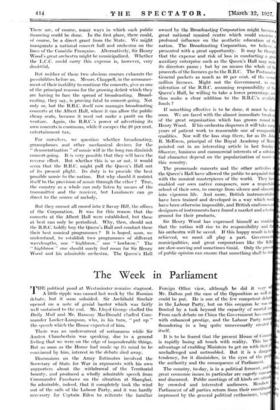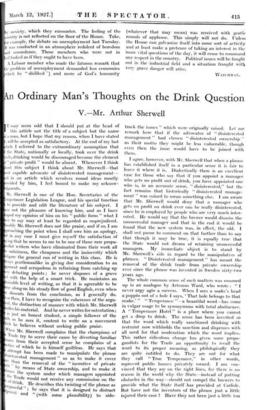The Week in Parliament
THE political pond at Westminster remains stagnant. A little ripple was caused last week by the Russian debate, but it soon subsided. Sir Archibald Sinclair opened on a note of genial banter which was fairly well sustained to the end. Mr. Lloyd George chaffed the Daily Mail and Mr. Ramsay MacDonald chaffed Com- mander Locker-Lampson, who, in his turn, " put up the speech which the House expected of him.
There was an undercurrent of Seriousness while Sir Austen Chamberlain was speaking, due to a general feeling that we were on the edge of imponderable things. But as soon as the 'House had made up its mind to be convinced by him, interest in the debate died away.
Discussions on the Army Estimates involved the Secretary of State for War in arguments with his own supporters about. the L withdrawal. of the Territorial bounty, and produced a wholly admirable speech. from Commander Fairshawe on the situation at Shanghai. So admirable, indeed, that it completely took the wind out of the sails of the Labour Party, and it was hardly necessary for Captain Eden to . reiterate the familiar Foreign Office view, although he did it very ir Mr. Dalton put the case of the Opposition as well ss could be put. He is one of the few competent debut in the Labour Party, but on this occasion he was fronted by a task beyond the capacity of mortal From each debate on China the Goverinnent has one with enhanced prestige, and the Labour Party rem' floundering in a bog quite unnecessarily created itself.
It is to be feared that the present 'Reuse of Contait is rapidly losing all touch with reality. This has .t advantage of enabling Ministers to get on with their J, unchallenged and untroubled: But it is a danger., tendency, for it diminishes; in the eyes of the poi' the authority . and the consequence Of Parliament. The country, to-day, is in a political ferment, and great economic issues in particular are eagerly (viva and discussed. Public meetings of all kinds arc atten by crowded and interested audiences. Members Parliament of all parties return from their coastituel impressed by the general political enthusiasm, tonl anxiety, - which they encounter. The feeling of the °nary is not reflected on- the floor of the House. Take, or example,. the debate on unemployment last Tuesday. t was conducted in an atmosphere redolent of boredom nd somnolence. Those members who were not in al looked is if they ought to have been.
A Labour member who made the fatuous remark that lie problem of unemployment demanded less economics which he "disliked ") and more of God's humanity . , '(whatever that May mean). Was reCeived with gentle rounds of applause: This simply will not do. Unless the House can galvanize itself into some sort of activity and at least make a pretence of taking an interest in the More vital questions Of the day, it will cease to command any respect in the country. Political issues will be fought out in the industrial field and a situation fraught with very grave danger will arise.
WATCHM AN.































































 Previous page
Previous page